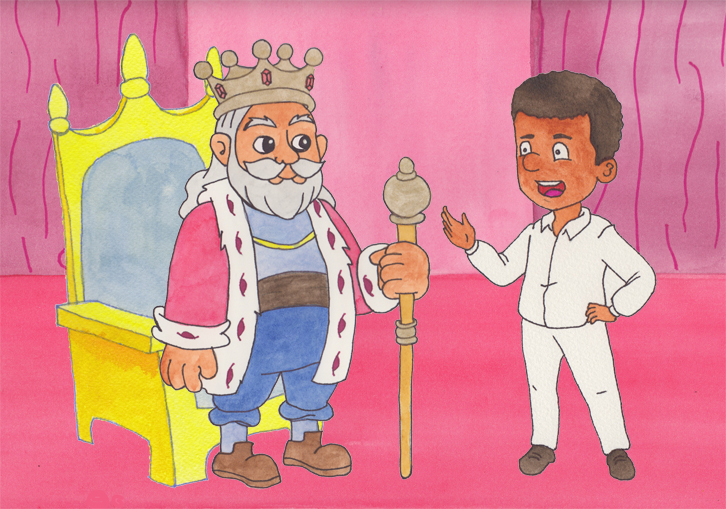
Jataka 306
Sujāta Jātaka
Sujāta’s Story
as told by Eric Van Horn
originally translated by H.T. Francis and R.A. Neil, Cambridge University
originally edited by Professor Edward Byles Cowell, Cambridge University
This story is nominally about forgiveness and living in peace and harmony. But it has some mildly disturbing misogyny and it does not ring true to the historical facts. While Mallikā was not without her faults, she was supremely kind, loving, and gentle. It was King Pasenadi, in fact, who was more prone to misdeeds.
“What is this egg-shaped fruit?” The Master told this story while living at Jetavana. It is about Queen Mallikā. One day, they say, there was a dispute at court between her and the King (King Pasenadi). The King was so enraged that he ignored her existence. Mallikā thought, “The Master, I fancy, does not know how angry the King is with me.” But the Master knew all about it, and he resolved to make peace between them. So early in the morning he put on his inner garment and—taking his bowl and robes—he entered Sāvatthi with a following of 500 monks and went to the palace gate.
The King took his bowl from him, brought him into the house, and placing him on the seat prepared for him. He poured the Water of Donation on the hands of the Saṇgha with the Buddha at their head, and he brought them rice and cakes to eat. But the Master covered up his bowl with his hand and said, “Sire, where is the Queen? What have you done with her, Reverend Sir?” The King replied, “Her head is turned, she is intoxicated with the honor she enjoys.”
“Sire,” he said, “after you yourself bestowed this honor on the woman, it is wrong of you now to get rid of her and not to be tolerant of any offence she has committed against you.”
The King heeded the words of the Master and sent for the Queen.
And she paid homage to the Master. “You ought,” he said, “to live together in peace.” And singing the praises of the joy of harmony he went on his way. And from that day they lived happily together.
The monks started a discussion in the Dharma Hall about how the Master had reconciled the King and Queen by a single phrase. The Master, when he came, asked what the monks were discussing. When they told him, he said, “Not only now, brothers, but formerly, too, I reconciled them by a single phrase of admonition.” And he told them this story from the past.
Once upon a time when Brahmadatta was the King of Benares, the Bodhisatta was his minister and his temporal and spiritual adviser.
Now one day the King stood at an open window looking into the palace court. And at this very moment the daughter of a fruit merchant, a beautiful girl named “Sujātā” in the flower of her youth, stood with a basket of jujubes (a kind of berry) on her head crying, “Jujubes, ripe jujubes, who will buy my jujubes?” But when she got to the palace she passed it by and did not venture into the royal court.
But the King no sooner heard her voice than he fell in love with her. And when he learned that she was unmarried, he sent for her and raised her to the dignity of chief Queen. He bestowed great honor on her. Now she was dear and pleasing in the King’s eyes. And one day the King sat eating jujubes in a golden dish. And Queen Sujātā, when she saw the King eating jujubes, asked him, “My lord, what in the world are you eating?” And she uttered the first stanza:
What is this egg-shaped fruit, my lord, so pretty and red of hue,
In a gold dish set before thee? Pray tell me, where they grew.
And the King was angry and said, “O daughter of a fruit merchant, a dealer in ripe jujubes, do you not recognize the jujubes, the special fruit of your own family?” And he repeated two stanzas:
Bare-headed and meanly clad, my Queen,
you once did feel no shame,
To fill your lap with the jujube fruit,
and now you dare ask its name.
You are eaten up with pride, my Queen
you find little pleasure in life,
Begone and gather your jujubes again.
You shall be no longer my wife.
Then the Bodhisatta thought, “No one except for me will be able to reconcile this pair. I will appease the King’s anger and prevent him from turning her out of doors.” Then he repeated the fourth stanza:
These are the taints of anyone, my lord,
promoted to high estate.
Forgive her and cease from this anger, O King,
For it was you that did make her great.

Figure: “Forgive her and cease from this anger…”
So the King at his word forgave the offence of the Queen and restored her to her former position. And from then on they lived amicably together.
The Master, his lesson ended, identified the birth: “At that time the King of Kosala (King Pasenadi) was the King of Benares, Mallikā was Sujātā and I was the minister.”
